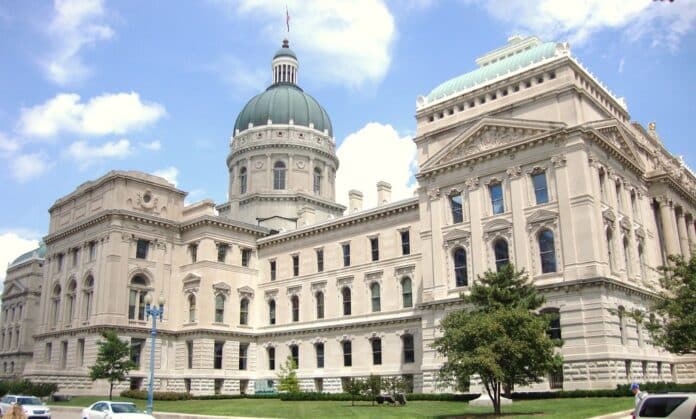INDIANAPOLIS — When customers visit Karen Robinson’s hair salon, Hair Dynamics, in New Palestine, they are asked to sign a release form before receiving services. The paperwork states they will not file a lawsuit against the business if they contract COVID-19 after visiting.
Robinson said almost all of her customers are happy to sign the form. But soon, they might not have to. Indiana legislators are working to pass legislation they say would provide more protections to employers and prevent unjustified lawsuits related to COVID-19.
House Bill 1002 would provide Indiana companies with immunity to lawsuits in most circumstances if someone was exposed to or contracted COVID-19 at a place of business. The exceptions would be for gross negligence or willful misconduct. The bill also provides protections to schools and health care providers.
The bill was co-authored by Rep. Chris Jeter, R-Fishers, along with three other legislators.
“Businesses have been struggling throughout this pandemic, and the last thing they need is to get hit with a frivolous lawsuit that could deepen their financial struggles,” Jeter said. “We must support Hoosier employers as they lead Indiana’s economic comeback.”
According to a survey by the National Federation of Independent Businesses, 55% of Indiana small-business owners said they were concerned about how they could be impacted by a COVID-related lawsuit.
The bill has passed the House of Representatives and has been referred to the Senate. Along with Jeter, Rep. Bob Cherry, R-Greenfield, also voted in favor of the legislation. Rep. Sean Eberhart, R-Shelbyville, said in January that he supported the bill but was not present on the day of voting.
Sen. Mike Crider, R-Greenfield, also plans to vote for the Senate version. The legislation, he said, is needed to protect business owners who are responsibly following CDC recommendations. He said some business owners were hesitant to reopen last year because of worries about lawsuits, and reducing that concern will help get the state economy back on track.
The bill also includes a prohibition on class-action lawsuits, even if the plaintiffs would be allowed to sue individually. It also specifies that recommendations by health agencies do not create new legal responsibilities for employers.
For Indiana business leaders, COVID-19 liability protections are a legislative priority. The Indiana Chamber of Commerce posted a statement on its website about the importance of protections against such lawsuits.
“Fear of litigation should not be a concern, and we are here to make sure this concern is eliminated,” the statement says. “Lawsuits could devastate businesses already struggling financially, and the threat of litigation could mean some businesses choose to remain shut, crippling efforts to restart the Hoosier economy.”
The Chamber suggests that in order for a lawsuit to be filed, someone must have suffered death or serious injury requiring them to be hospitalized for at least 72 hours. Employers that make a “good faith” effort to protect employees from COVID-19 should be shielded from liability. So should manufacturers of equipment that claims to protect against the coronavirus. For the purposes of worker’s compensation, COVID-19 should be considered an accidental injury, the organization suggests.
Organized labor, on the other hand, has opposed efforts to offer employers broad liability shields. The AFL-CIO published a letter to legislators on its website urging them not to pass such legislation, saying it would deny workers their right to a day in court.
“The COVID-19 virus has spread rampantly in workplaces across America; millions of essential workers have become sick; and hundreds of thousands of Americans have died from the virus; but it did not have to be this way,” the letter said. “Employers could have controlled this pandemic with sensible safety measures. That did not have to happen. The federal government, and OSHA and MSHA in particular, have been completely absent throughout the pandemic.”
Randy Sorrell, director of the Hancock County Economic Development Council, said he was not familiar with the specifics of the legislation the general assembly is considering. However, he said, liability protections are a topic many people are considering.
Regardless of what the legal requirements for such lawsuits end up being, Sorrell said, anyone hoping to sue their employer for damages related to COVID-19 will likely have a tough time making a case.
“Can you actually prove that a person was infected at their place of employment as opposed to the place they went an hour after they left their job site?” he said. “I think that’s a very difficult challenge, and I don’t know the legislative fix for that problem.”
Retta Livengood, director of the Greenfield Area Chamber of Commerce, said she thinks business owners in Hancock County are generally doing the best they can to protect their employees from COVID-19. She said she often tells business owners that they should make sure to follow the advice of public health officials.
“You have to rely on the advice of trained professionals,” she said.

